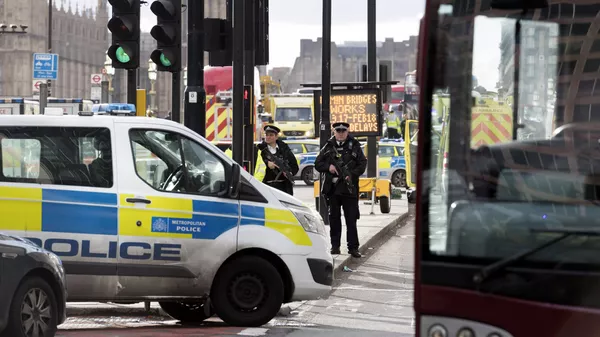Radio Sputnik discussed this with Dr. David Lowe, terrorism and security expert.
Sputnik: What is your opinion on these new measures? Do you think that they are going to be effective and do you agree with the policies that are being put into place?
Dr. David Lowe: I think there are a couple of measures there, which were longer sentences for those committing terrorism offenses. I think that's fairly reasonable depending what offenses have been committed of course. The one as regards carrying out surveillance of communities, I think this is going to be very delicately done and also I think we need to get more detail and obviously when the new version of Contest, the UK Government's counter terrorism policy and the counter terrorism bill that looks like they're going to introduce. Let's see what's in the detail of that because when the prevent strategy, this is the pre-criminal part of Contest that is aimed at helping people who are vulnerable to being drawn towards terrorism. When that was initially brought out it was to deal with violent Islamist ideology.
Sputnik: The UK's been criticized for the police cuts and actually experts have said that they've already cut down the numbers of police. Is this going to reverse to what we had before that?
Dr. David Lowe: This is the issue, isn't it? How is this going to be done because those austerity cuts from 2009, the UK police have lost 20,000 officers and of course, the area that really suffered from that was neighborhood policing, the community aspect. One of the best sources of information and in building trust in the police is neighborhood policing, but that's been at the brunt of all the cuts. As regard to counter terrorism it didn't have a cut, but it's not had great increases in its budgets and in its staffing level. So let's wait and see what detail comes out but these are pertinent questions I think we've got to be asking: Who is going to fund this is?; Is there going to be an increase in staffing?; How are you going to get this message across? It's about all communities and not again have a divisive policy that will create suspect communities which in this case we look at what's happened in the past, people go, it will most likely to be the Muslim community.
Sputnik: Has there been detail as far as what kind of additional powers police and other organizations will have?
Dr. David Lowe: I think this is interesting because in the UK, the security service and the police have some of the widest powers to deal with counter terrorism. When this was first mooted last year following the attacks, you know, do they need more powers, I was questioning well what powers do you need? Because they are pretty wide now both on dealing with preventative measures such as obtaining information that's likely to be of use to a terrorist, wider powers of surveillance, including electronic surveillance.
Sputnik: And how do you really balance privacy, security, safety and human rights? How do you balance those?
Dr. David Lowe: It is getting that balance. It must be legislated for with strict safeguards in place I think that's really important. The Investigatory Powers Act which is brought in late 2016 here to deal with electronic communications has got robust safeguards, perhaps if I could change it one way, I would stop politicians like the home secretary, in certain cases issuing the warrants. Let's let the judges issue them. It's best to have a judicial supervision on it. We have to accept that in cases of terrorism and serious crime, like drug trafficking, people trafficking, etc., the police and the security services need to do some monitoring and perhaps via the safeguards in accessing that telecom status I think that's important. As regards other forms of surveillance, here in the UK it's very strictly monitored, as regards accessing either physically watching someone, putting electronic devices in to monitor any communications going on within premises, but it's only done an exceptional cases. This is not done randomly to monitor everybody.
The views and opinions expressed in this article are solely those of the speaker and do not necessarily reflect those of Sputnik.





